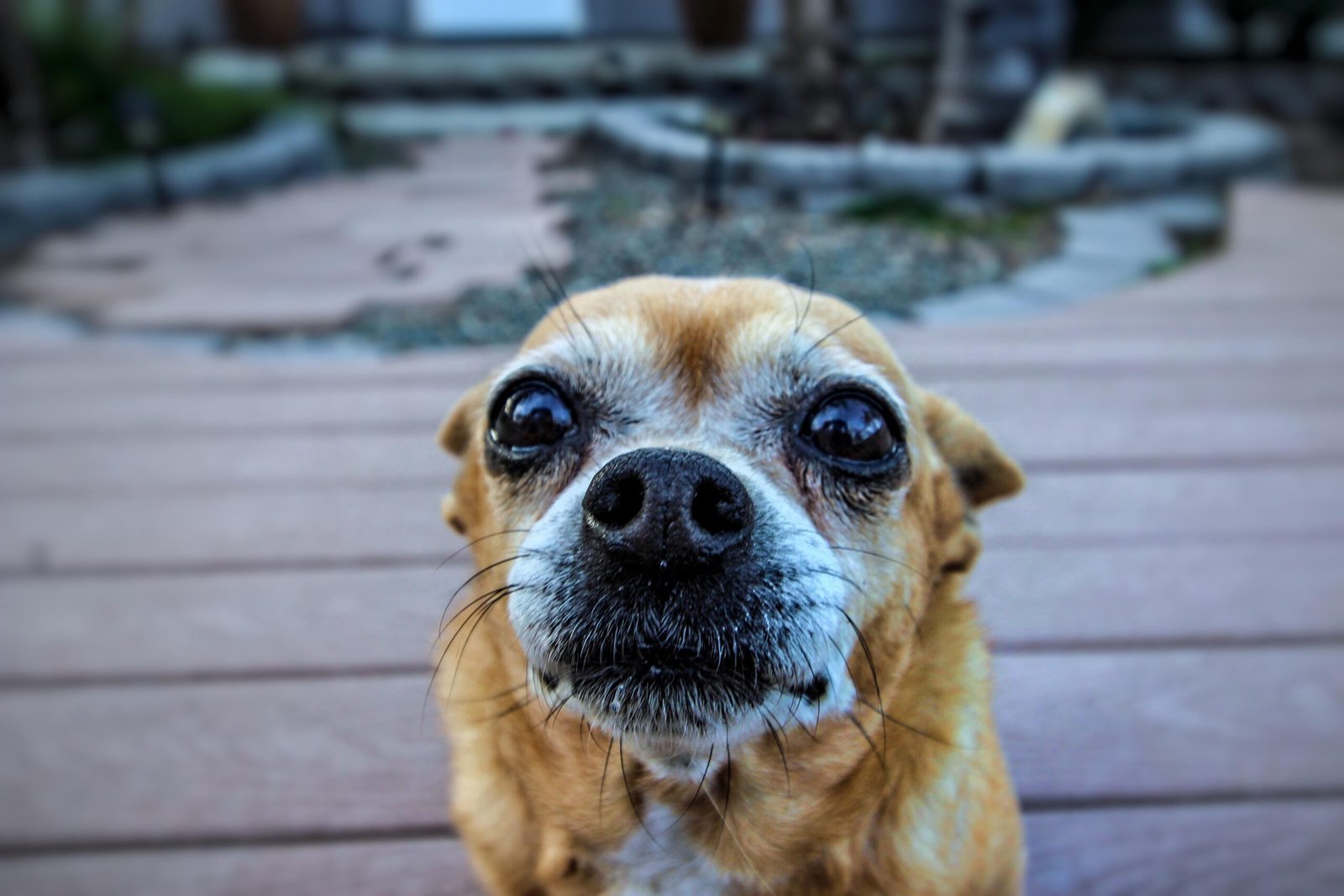As a professional, it is fascinating to dive into the age of a 14-year-old chihuahua. This diminutive breed often surprises many with their longevity. Did you know that a 14-year-old chihuahua is equivalent to a human reaching their 70s or 80s? Despite their tiny size, chihuahuas have the potential to age gracefully, defying the conventional wisdom that smaller dogs live longer.
When examining the age of a 14-year-old chihuahua, it is important to consider their breed’s history. Originating from Mexico, chihuahuas were highly revered by the Aztecs and thought to possess mystical powers. Today, these adorable canines continue to captivate us. However, their age is not only determined by genetics but also by factors such as diet, exercise, and overall healthcare. By providing proper nutrition and regular veterinary care, we can increase their lifespan and ensure they live their golden years in good health.

How Old is a 14 Year Old Chihuahua?
Chihuahuas are small, lively, and adorable dogs. Known for their big personalities and tiny size, they have become a popular choice for many dog lovers. With their small stature, it’s no wonder that people often wonder just how long these little pups can live. In this article, we will explore the average lifespan of a Chihuahua and answer the question: how old is a 14-year-old Chihuahua?
Understanding the Lifespan of Chihuahuas
Chihuahuas, on average, have a lifespan of 12 to 20 years. This means that these pint-sized companions can be part of your life for a long time if given proper care and attention. Some Chihuahuas have even lived beyond the age of 20, but this is relatively rare. With advances in veterinary care and nutrition, the average lifespan of Chihuahuas has been increasing over the years.
Several factors can influence the lifespan of a Chihuahua, including genetics, diet, exercise, and overall healthcare. Responsible breeding practices can help reduce the risk of hereditary health conditions and increase the chances of a longer life. Providing a healthy and balanced diet, regular exercise, routine vet check-ups, and a loving environment can also contribute to a Chihuahua’s longevity.
A Chihuahua’s age can be determined based on their physical and behavioral characteristics. As they age, their energy levels may decrease, and they may develop health issues associated with old age. It is important to be aware of these changes and provide the necessary care and support as they continue to grow older.
What to Expect from a 14-Year-Old Chihuahua
A 14-year-old Chihuahua can be considered a senior dog. At this age, they may start to show signs of aging, both physically and mentally. Their energy levels may decrease, and they may become less active than they were in their younger years. It is important to provide them with a comfortable environment and ensure they have access to soft bedding and easy-to-reach food and water bowls.
Older Chihuahuas may experience health issues commonly associated with aging, such as arthritis, dental problems, and vision or hearing loss. Regular visits to the veterinarian can help detect and manage these conditions. Providing a senior-friendly diet, which may include supplements to promote joint health, can also support their overall well-being.
While some Chihuahuas at this age may still be sprightly and energetic, it is essential to monitor their activity levels and ensure they’re not overexerting themselves. Regular exercise is still important, but gentle walks and playtime are more suitable for their aging bodies.
Tips for Caring for a 14-Year-Old Chihuahua
1. Regular Veterinary Check-ups: It is important to schedule regular check-ups with your veterinarian to monitor your Chihuahua’s health and detect any early signs of age-related issues.
2. Proper Nutrition: Feed your 14-year-old Chihuahua a well-balanced diet tailored to their senior needs. Consult your veterinarian for recommendations on the right type and amount of food.
3. Exercise: Keep your Chihuahua active with gentle exercise. Short walks and interactive play sessions can help maintain their mobility and mental stimulation.
4. Dental Care: Dental health is crucial for older Chihuahuas. Regular teeth brushing and dental check-ups can help prevent dental diseases and keep their teeth clean and healthy.
5. Comfortable Environment: Create a comfortable and safe environment for your older Chihuahua. Provide soft bedding to support their aging joints and ensure their surroundings are senior-dog friendly.
Remember, every Chihuahua is unique, and some may age differently than others. It is important to monitor their health and well-being closely and provide individualized care as needed.
The Importance of Quality Time and Love
Regardless of their age, Chihuahuas thrive on love and attention. Spending quality time with your 14-year-old Chihuahua is essential for their overall well-being. Whether it’s cuddling on the couch, gentle playtime, or simply being present, the love and care you provide can make a significant difference in their happiness and life expectancy.
As your Chihuahua enters their senior years, cherish the moments you have together and make every day special. They have been a loyal companion, and now it’s your turn to give them the care and love they deserve. With proper care, your 14-year-old Chihuahua can continue to bring joy to your life for many more years to come.
Common Health Issues in Aging Chihuahuas
As Chihuahuas age, they are prone to developing certain health conditions that are more common in older dogs. Here are a few health issues to be aware of:
1. Arthritis: This degenerative joint disease can cause pain, stiffness, and mobility issues in older Chihuahuas. Providing joint supplements and appropriate exercise can help manage this condition.
2. Dental Disease: Older Chihuahuas may experience dental problems, including gum disease and tooth decay. Regular dental care, such as teeth brushing and professional cleanings, can help prevent these issues.
3. Vision and Hearing Loss: Just like humans, Chihuahuas may experience age-related vision and hearing loss. Keeping their environment familiar and providing extra support and care can help them adjust to these changes.
4. Heart Problems: Older Chihuahuas may develop heart conditions, such as heart murmurs or congestive heart failure. Regular check-ups with a veterinarian can help detect and manage these issues.
5. Bladder and Kidney Issues: Aging Chihuahuas may be more prone to bladder and kidney problems, such as urinary incontinence or kidney disease. Monitoring their water intake and providing regular bathroom breaks can help manage these conditions.
Caring for an Aging Chihuahua
When caring for an aging Chihuahua, it’s important to focus on their specific needs and provide them with the care and attention they require. Here are a few tips:
1. Comfort and Safety: Create a safe and comfortable environment for your aging Chihuahua by providing soft bedding and easy access to food, water, and their favorite spots.
2. Balanced Diet: Feed your senior Chihuahua a high-quality, age-appropriate diet that supports their changing nutritional needs. Consult your veterinarian for specific dietary recommendations.
3. Regular Exercise: While older Chihuahuas may not be as energetic as they once were, gentle exercise is still important for their physical and mental well-being. Adjust their exercise routine to suit their age and mobility levels.
4. Regular Check-ups: Schedule regular veterinary check-ups to monitor your Chihuahua’s health and catch any potential problems early on. Your vet can also recommend vaccinations, dental care, and other preventive measures.
5. Mental Stimulation: Keep your aging Chihuahua’s mind active by providing puzzle toys, interactive games, and gentle training exercises. Mental stimulation can help prevent cognitive decline and keep them engaged.
Chihuahua Lifespan Statistics
According to a study conducted by Banfield Pet Hospital, the average lifespan of Chihuahuas is around 12 to 20 years. This makes them one of the longer-living dog breeds. However, it’s important to note that individual Chihuahuas may vary in their lifespan depending on various factors.
The study also found that larger Chihuahuas tend to have a shorter lifespan compared to their smaller counterparts. Female Chihuahuas generally live longer than males, with an average lifespan of 15 years compared to 13 years for males.
Genetics, diet, exercise, and overall healthcare play a significant role in determining a Chihuahua’s lifespan. By providing them with proper care, regular veterinary check-ups, and a loving environment, you can help ensure that your Chihuahua lives a long, happy, and healthy life.
Key Takeaways – How old is a 14-year-old Chihuahua?
- Chihuahuas can live for a long time, with an average lifespan of 12-20 years.
- At 14 years old, a Chihuahua is considered a senior dog.
- Their age can be compared to that of a human in their 70s or 80s.
- Older Chihuahuas may start experiencing age-related health issues.
- Regular veterinary check-ups are important for maintaining their health and well-being.
Frequently Asked Questions
Welcome to our FAQ section where we answer common questions about the age of a 14-year-old Chihuahua. Get ready to learn more about your furry friend!
1. At what age is a Chihuahua considered a senior?
A Chihuahua is generally considered a senior when they reach around 7 to 10 years old. However, it’s important to note that this can vary from dog to dog. Factors such as genetics, overall health, and lifestyle can influence the aging process. Some Chihuahuas may start showing signs of aging earlier or later than others.
As your Chihuahua reaches their senior years, it may be a good idea to schedule regular vet check-ups and consider adjustments to their diet and exercise regimen. This can help ensure they stay healthy and comfortable as they enter their golden years.
2. How long do Chihuahuas usually live?
On average, Chihuahuas have a lifespan of 12 to 20 years. This is longer compared to larger dog breeds. However, it’s important to remember that every Chihuahua is different, and factors such as genetics, lifestyle, and overall health can influence their lifespan.
Providing your Chihuahua with a balanced diet, regular exercise, and proper veterinary care can help increase their chances of living a long and healthy life. It’s also important to keep them away from potential hazards, such as extreme weather conditions and toxic substances, to ensure their well-being.
3. Are Chihuahuas more prone to health problems as they age?
Like all living beings, Chihuahuas are susceptible to age-related health issues. Some common health problems that Chihuahuas may develop as they get older include dental issues, heart problems, arthritis, and vision or hearing loss. It’s essential to monitor your Chihuahua’s health and consult with a veterinarian regularly.
By providing proper nutrition, regular exercise, and giving them the medical attention they need, you can help mitigate the risk of certain age-related health problems. Additionally, keeping their environment safe and comfortable can contribute to their overall well-being as they age.
4. How can I help my 14-year-old Chihuahua stay active and healthy?
Maintaining an active lifestyle is important for the health and well-being of your 14-year-old Chihuahua. Here are a few tips to help them stay active and healthy:
Firstly, consult with your veterinarian to ensure your Chihuahua’s exercise routine is suitable for their age and health condition. Providing daily walks, engaging in interactive playtime, and offering mentally stimulating toys can help keep them physically and mentally active. Additionally, maintaining a balanced diet and ensuring regular veterinary check-ups are vital for their overall health.
5. What are some signs that my 14-year-old Chihuahua is slowing down due to age?
As Chihuahuas age, they may exhibit certain signs of slowing down. Some common indications that your 14-year-old Chihuahua may be experiencing age-related changes include decreased energy levels, difficulty getting up or moving around, changes in appetite, weight gain or loss, reduced hearing or vision, and increased sleep or rest time.
If you notice any significant changes in your Chihuahua’s behavior or health, it’s crucial to consult with your veterinarian. They can provide guidance on how to best support your Chihuahua’s aging process and address any potential health concerns.

In conclusion, the aim is for the reader to grasp the article’s main ideas in just two paragraphs.
